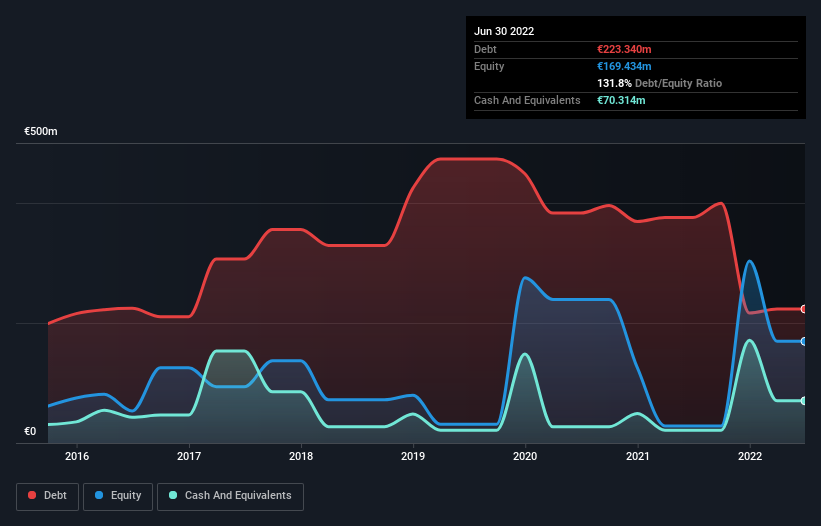
Warren Buffett famously said, 'Volatility is far from synonymous with risk.' When we think about how risky a company is, we always like to look at its use of debt, since debt overload can lead to ruin. We note that Juventus Football Club S.p.A. (BIT:JUVE) does have debt on its balance sheet. But should shareholders be worried about its use of debt?
When Is Debt A Problem?
Debt assists a business until the business has trouble paying it off, either with new capital or with free cash flow. Ultimately, if the company can't fulfill its legal obligations to repay debt, shareholders could walk away with nothing. However, a more usual (but still expensive) situation is where a company must dilute shareholders at a cheap share price simply to get debt under control. By replacing dilution, though, debt can be an extremely good tool for businesses that need capital to invest in growth at high rates of return. When we examine debt levels, we first consider both cash and debt levels, together.
Check out our latest analysis for Juventus Football Club
What Is Juventus Football Club's Net Debt?
You can click the graphic below for the historical numbers, but it shows that Juventus Football Club had €223.3m of debt in June 2022, down from €375.8m, one year before. On the flip side, it has €70.3m in cash leading to net debt of about €153.0m.

How Healthy Is Juventus Football Club's Balance Sheet?
Zooming in on the latest balance sheet data, we can see that Juventus Football Club had liabilities of €379.5m due within 12 months and liabilities of €382.8m due beyond that. Offsetting these obligations, it had cash of €70.3m as well as receivables valued at €114.1m due within 12 months. So its liabilities outweigh the sum of its cash and (near-term) receivables by €577.9m.
This deficit is considerable relative to its market capitalization of €764.3m, so it does suggest shareholders should keep an eye on Juventus Football Club's use of debt. Should its lenders demand that it shore up the balance sheet, shareholders would likely face severe dilution. When analysing debt levels, the balance sheet is the obvious place to start. But it is future earnings, more than anything, that will determine Juventus Football Club's ability to maintain a healthy balance sheet going forward. So if you're focused on the future you can check out this free report showing analyst profit forecasts.
In the last year Juventus Football Club had a loss before interest and tax, and actually shrunk its revenue by 5.9%, to €443m. That's not what we would hope to see.
Caveat Emptor
Over the last twelve months Juventus Football Club produced an earnings before interest and tax (EBIT) loss. Indeed, it lost a very considerable €237m at the EBIT level. When we look at that and recall the liabilities on its balance sheet, relative to cash, it seems unwise to us for the company to have any debt. So we think its balance sheet is a little strained, though not beyond repair. Another cause for caution is that is bled €190m in negative free cash flow over the last twelve months. So suffice it to say we consider the stock very risky. When analysing debt levels, the balance sheet is the obvious place to start. But ultimately, every company can contain risks that exist outside of the balance sheet. Be aware that Juventus Football Club is showing 2 warning signs in our investment analysis , and 1 of those is a bit concerning...
If you're interested in investing in businesses that can grow profits without the burden of debt, then check out this free list of growing businesses that have net cash on the balance sheet.
New: Manage All Your Stock Portfolios in One Place
We've created the ultimate portfolio companion for stock investors, and it's free.
• Connect an unlimited number of Portfolios and see your total in one currency
• Be alerted to new Warning Signs or Risks via email or mobile
• Track the Fair Value of your stocks
Have feedback on this article? Concerned about the content? Get in touch with us directly. Alternatively, email editorial-team (at) simplywallst.com.
This article by Simply Wall St is general in nature. We provide commentary based on historical data and analyst forecasts only using an unbiased methodology and our articles are not intended to be financial advice. It does not constitute a recommendation to buy or sell any stock, and does not take account of your objectives, or your financial situation. We aim to bring you long-term focused analysis driven by fundamental data. Note that our analysis may not factor in the latest price-sensitive company announcements or qualitative material. Simply Wall St has no position in any stocks mentioned.
About BIT:JUVE
Juventus Football Club
Operates as a professional football club in Italy.
Imperfect balance sheet very low.
Similar Companies
Market Insights
Community Narratives



